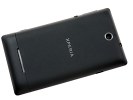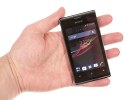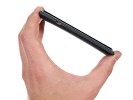GSMArena team, 22 April 2013.
Introduction
Well, this sounds like an apt title really. The Sony Xperia E is among the cheapest packages on offer from Sony, second to only the Tipo. From the design theme of the first generation of Sony smartphones, to the familiar internals, the Sony Xperia E has little to no surprises. Especially that we've actually seen its twin already.
The Sony Xperia E and Xperia E dual are nearly identical, with the number of SIM slots the only notable hardware difference. It boils down to what makes more sense to you as a user - dual-SIM support or the more recent Android 4.1.1 Jelly Bean.



Sony Xperia E official pictures
When talking entry-level smartphones, a single-SIM package usually has to try harder to make itself noticed. Dual-SIM versions are usually regarded as niche devices but they have the benefit of a clearly defined target audience. There's a lot of competition in Sony Xperia E's price bracket, and not just droids either. Yet, Jelly Bean right out of the box gives it a good enough start. Let's take a closer look at what else it has to offer:
Key features
- Quad-band GSM/GPRS/EDGE and -band UMTS support
- 7.2 Mbps HSDPA and 5.76 Mbps HSUPA
- 3.5" 256K-color capacitive TFT touchscreen of HVGA resolution (320 x 480)
- Android OS v4.1.1 Jelly Bean
- 1 GHz Cortex-A5 CPU, Adreno 200 GPU, Qualcomm MSM7227A chipset
- 512 MB of RAM
- 2GB of user-accessible built-in storage (4GB total)
- microSD slot (32GB supported)
- 3.15 MP fixed-focus camera, geo-tagging
- VGA video @ 30fps
- Wi-Fi b/g/n, Wi-Fi hotspot
- GPS with A-GPS
- Accelerometer and proximity sensor
- Standard 3.5 mm audio jack
- Stereo FM radio with RDS
- microUSB port (charging) and stereo Bluetooth v2.1
- User-accessible battery, Li-Ion 1530 mAh
Main disadvantages
- Feeble chipset and uninspiring performance
- Mediocre screen quality
- Fixed-focus camera, No LED flash
- Video recording No front-facing camera
The Sony Xperia E is yet another Qualcomm-powered 3.5-incher for Sony in the entry level market. It's got the upper hand over the likes of the Tipo and Miro (clocked at 800MHz), and probably even the Xperia J which is has the exact same 1GHz chipset but a bigger and more pixel-rich FWVGA screen. Bottom line, no record-breaking speed is to be expected here but the Xperia E will most likely get the job done for first-time smartphone users.
So, the main thing to try and find out here is whether a reasonably good-looking basic smartphone will prove an equally reasonable performer. As usual, we'll start with our traditional hardware overview right after the break.
}




No comments:
Post a Comment